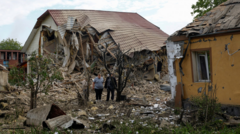In a significant escalation of hostilities, Ukraine has reported that Russia launched its most extensive drone offensive to date, marking a grim backdrop to the anticipated discussions between Trump and Putin. Casualties have been reported, while the ongoing dynamics of the conflict show little sign of resolution.
Ukraine Faces Unprecedented Drone Assault Ahead of High-Stakes Trump-Putin Dialogue

Ukraine Faces Unprecedented Drone Assault Ahead of High-Stakes Trump-Putin Dialogue
Ahead of a crucial call between Donald Trump and Vladimir Putin, Ukraine reports the largest drone attack since the onset of the conflict, with casualties confirmed.
Ukraine has declared that Russia has unleashed its largest drone attack since the escalation of conflict began, with strikes reported across various regions including Kyiv, resulting in multiple casualties. The offensive unfolded one day before an impending call between U.S. President Donald Trump and Russian leader Vladimir Putin, sparking concerns over ongoing hostilities.
Ukrainian officials confirmed that the air force detected the launch of 273 drones early on Sunday, targeting key areas such as central Kyiv and regions in the east, including Dnipropetrovsk and Donetsk. Reports indicate that 88 drones were intercepted, while 128 strayed off course without causing further damage. The attacks claimed the life of one individual in the Obukhiv district of Kyiv, with at least three others wounded, including a young child.
The drone assault stands as a stark reminder of the ongoing violence, particularly following Russia's previous major drone strike on the third anniversary of its full-scale invasion on February 23, which involved 267 drones. The Kremlin has countered Ukraine's claims by stating that it successfully intercepted 25 Ukrainian drones overnight.
Amid these tensions, German Chancellor Friedrich Merz mentioned that he and leaders from the UK, France, and Poland would engage in a virtual meeting with Trump before his conversation with Putin. Their collective visit to Ukraine two weeks prior aimed to advocate for a proposed 30-day ceasefire, an initiative supported by a "coalition of the willing."
Ukraine's intelligence has raised suspicions that Russia may attempt to launch a "training and combat" intercontinental ballistic missile in a show of force, though Moscow has remained silent on these assertions. Ukrainian officials have condemned the drone strikes as evidence that Russia shows no willingness to cease hostilities in light of international calls for peace.
Andriy Yermak, an advisor to Ukraine’s president, asserted that the diplomatic engagement in Istanbul was merely a guise, declaring, "Putin wants war." Following the recent talks, Trump has suggested that no effective peace process would emerge without direct dialogue with Putin. He has proposed a ceasefire agreement, warning of potential sanctions should Russia continue its aggressions.
Ukrainian President Volodymyr Zelensky has expressed willingness to accept an immediate ceasefire; however, Russia insists that any pause in fighting hinges on halting military supplies to Ukraine. These negotiations are underpinned by contentious terms from Russia, including Ukraine's acceptance of neutrality and a reduction of its military capabilities—demands that Ukraine firmly rejects as unacceptable.
Currently, Russian forces maintain control over approximately 20% of Ukraine’s territory, including the Crimea peninsula, which has been unlawfully annexed since 2014. On Sunday, President Zelensky was also witnessed at the Vatican, engaging in private discussions with Pope Leo following the pontiff’s inauguration, where topics of sanctions against Russia and pathways to peace were highlighted.






















